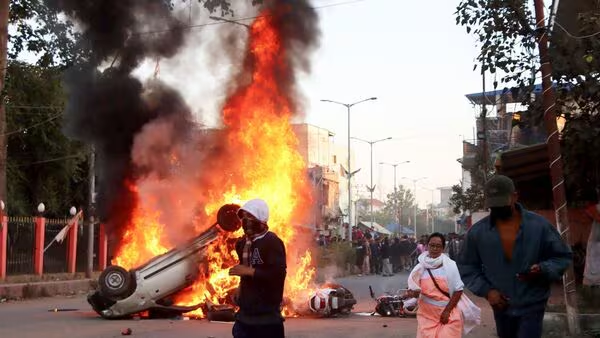
Manipur: Centre clueless as killings continue
The situation in the border state of Manipur has deteriorated further over the past 10 days. Around 20 people have reportedly been killed in a fresh wave of violence that has gripped the state since 7 November. The recovery of the bodies of five women and children, among the 11 abducted by militants on 17 November, highlights the brutal dimensions of the ongoing ethnic violence. The Centre has reimposed the Armed Forces Special Powers Act (AFSPA), which had been withdrawn only recently after protests spanning over a decade. The attack on Saturday night on the homes of 15 legislators, including those of PWD Minister Govindas Konthoujam and a Congress MLA, marks a troubling escalation.
The attack, suspected to be carried out by Kuki-Zo militants, underscores the weakening control of the Biren Singh government over the administration. This has led to the withdrawal of support by the National People’s Party (NPP), led by Meghalaya Chief Minister Conrad Sangma. The NPP, a key member of the North East National Democratic Alliance, has been part of BJPled governments in at least three states. Schools have been ordered to close, curfews imposed and internet services suspended. The intensity of the violence has compelled Union Home Minister Amit Shah to cut short his election campaigning in Maharashtra and return to the capital for consultations. With the death toll surpassing 260, hundreds injured, over 60,000 displaced and living in camps, more than 250 churches burnt, businesses suffering losses and the state’s reputation as a tourist destination damaged, the situation in Manipur demands careful handling. Although the Centre has deployed the Army in Imphal, it is evident that addressing the deeply fractured social fabric requires more than just maintaining law and order. The resurgence of violence is a clear indication that the wounds inflicted by the Meitei-Kuki conflict, which erupted on 3 May 2023, have been allowed to fester.
Over the past 19 months, the situation has become increasingly complex, with venomous tensions emerging from multiple fronts. While the BJP’s majority in the state assembly ensures no immediate threat to the stability of the Biren Singh government, it is pertinent to ask whether the Centre should consider replacing Chief Minister Biren Singh, who appears to have lost public trust, even if not the support of his party or legislators. There are, in fact, signs of dissent within the BJP, with some anti-Biren Singh MLAs distancing themselves from his administration.
A more acceptable leader could perhaps facilitate efforts to heal the deep ethnic divisions in a state that has long been vulnerable to militancy due to its porous borders and transnational ethnic ties. The Centre must undertake a more meaningful intervention, as it is currently perceived as partisan in a conflict involving the two principal social groups. Prioritising efforts to rebuild trust among communities sceptical of the Centre’s neutrality is essential to restoring peace in Manipur.
 English daily published in Bengaluru & Doha
English daily published in Bengaluru & Doha






